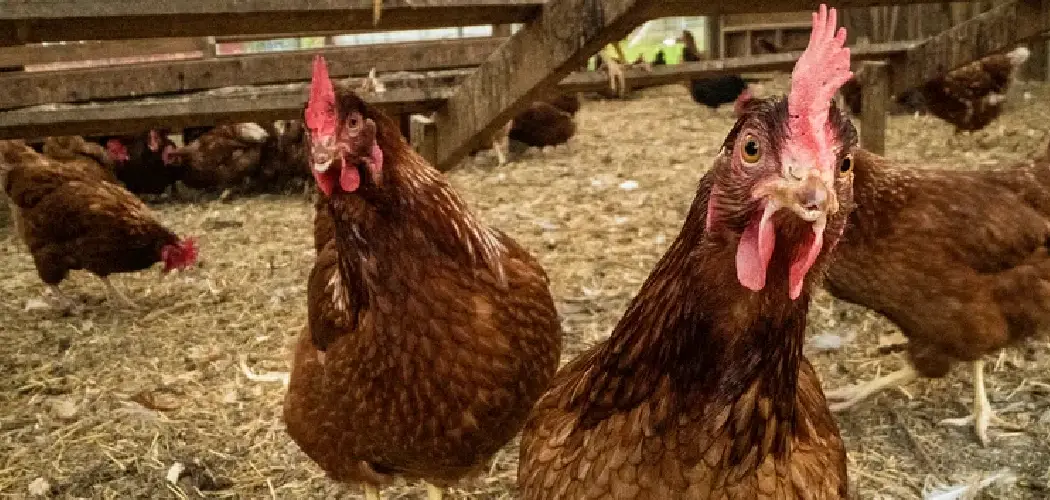Chickens are social animals that often live in groups or flocks. While this can be beneficial for their overall well-being, it can also lead to aggressive behavior among them. One common issue that chicken owners face is chickens pecking each other.
Pecking is a natural behavior for chickens as they use their beaks to explore and interact with their environment. However, when this behavior turns into aggressive pecking, it can cause serious harm and even death to the chickens involved.
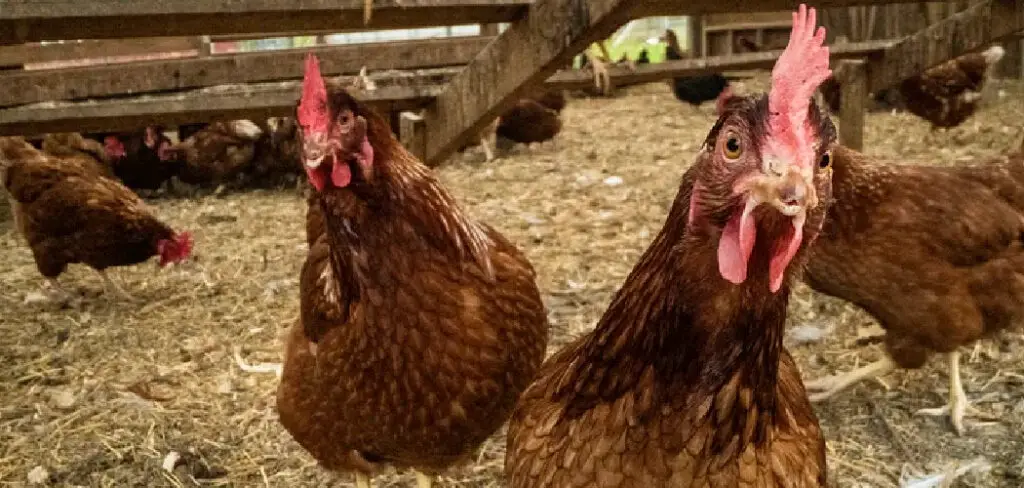
The main advantage of learning to keep chickens from pecking each other is that it leads to a healthier and more productive flock. By preventing cannibalism and aggression among your chickens, you can ensure their overall well-being and reduce stress levels within the flock. In this blog post, You will learn in detail how to keep chickens from pecking each other.
Step-by-step Instructions for How to Keep Chickens From Pecking Each Other
Step 1: Inspect the Living Space
Inspecting the living space is an important first step in preventing chickens from pecking each other. Make sure there is plenty of room for all the chickens to move around and access food and water easily. A cramped living space can lead to stress and aggression among chickens.
Hens often peck at each other when they are hungry or thirsty. It is crucial to provide enough food and water for all the chickens in the coop. Consider installing multiple feeding and watering stations to avoid overcrowding and competition.
Step 2: Add Hiding Spots
Chickens are social animals but also need their space. Adding hiding spots, such as boxes or crates, can give them a place to escape from other chickens if needed. This can help reduce stress and prevent aggressive behavior.
A dirty living space can lead to unhygienic conditions, which can cause stress and illness in chickens. Regularly cleaning the coop and removing any wet or soiled bedding can help maintain a healthy environment for your chickens.

Step 3: Provide Entertainment
Chickens are curious creatures and can become bored easily. Boredom can lead to pecking at each other out of frustration. Providing entertainment, such as hanging treats or toys for them to peck at, can keep them occupied and reduce the likelihood of aggression.
When introducing new chickens to the flock, it is important to do so slowly and carefully. This gives the birds a chance to get used to each other’s presence without feeling threatened or territorial. Keep an eye on their interactions and separate them if necessary.
Step 4: Check for Parasites
Parasites can cause discomfort and irritability in chickens, which can lead to pecking behavior. Regularly check your chickens for any signs of parasites and treat accordingly to keep them healthy and content.
A well-balanced diet is essential for the overall health and well-being of chickens. Make sure they are getting enough protein, vitamins, and minerals in their diet to prevent nutritional deficiencies that could lead to aggressive behavior.
Step 5: Provide Perches and Roosting Spots
Chickens naturally seek higher ground to rest and sleep. Providing perches or roosting spots in the coop can give them a place to retreat and feel safe, reducing the likelihood of pecking at each other.
Every flock is different, and it’s important to monitor their behavior and dynamics regularly. If you notice any signs of aggression or pecking, take necessary steps to address the issue and ensure the well-being of all your chickens.
By following these steps, you can create a harmonious living environment for your flock and prevent pecking behavior among chickens.
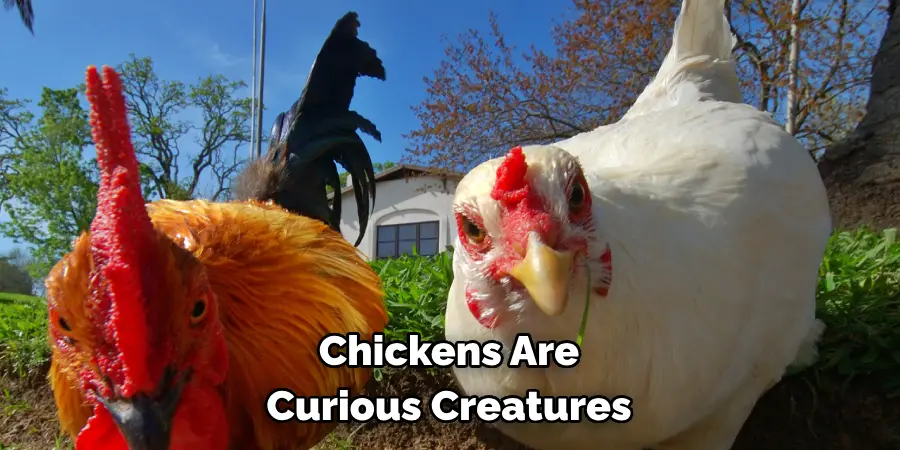
Safety Tips for How to Keep Chickens From Pecking Each Other
- Provide Enough Space – Chickens need space to move around, explore and establish their own territory. If they are overcrowded, it can cause stress and lead to aggressive behavior towards each other. Make sure you have enough space for your chickens according to their breed and keep them in separate coops if necessary.
- Keep Them Busy – When chickens are bored, they may resort to pecking each other as a form of entertainment. To prevent this, make sure to provide them with plenty of activities such as perches, toys and scattered food for them to forage.
- Address Any Injuries Immediately – If you do notice any injuries on your chickens caused by pecking, it’s important to address them immediately. Isolate the injured chicken and treat the wound to prevent infection and further pecking from other chickens.
- Monitor Their Diet – A well-balanced diet is essential for keeping your chickens healthy and preventing aggressive behavior. Make sure they have access to quality feed and supplements, as well as fresh water at all times.
- Introduce New Chickens Slowly – When adding new chickens to your flock, it’s important to introduce them slowly. This allows the established chickens to get used to the presence of the new ones and reduces the likelihood of aggression.
- Remove Any Aggressive Chickens – If you notice one or more chickens displaying aggressive behavior towards others, it may be necessary to remove them from the flock. Isolate them in a separate area and observe their behavior before reintroducing them back to the group.
- Seek Professional Help – If your chickens continue to display aggressive behavior towards each other despite implementing these precautions, it’s best to seek advice from a veterinarian or experienced poultry farmer. They can help identify any underlying issues and provide guidance on how to address them.
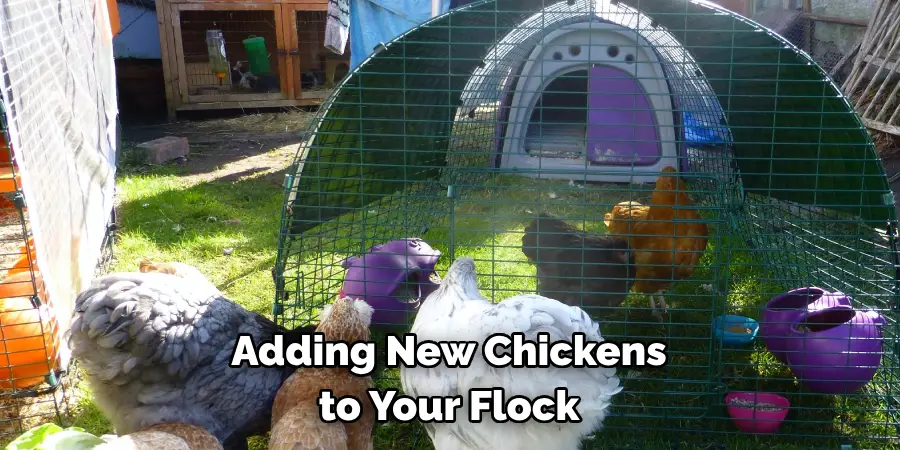
It’s important to remember that while pecking among chickens is a normal behavior, excessive and aggressive pecking can be harmful to their well-being. By following these safety tips, you can promote a peaceful environment for your chickens and prevent any harm caused by pecking.
Importance of Recognizing Signs of Overheating in Chicks
Summer can be a challenging time for chicken farmers, as high temperatures can pose a serious threat to the health and well-being of their flock. Chickens are particularly vulnerable to overheating due to their small body size and limited ability to regulate their body temperature.
As a responsible chicken owner, it is crucial to recognize the signs of overheating in your chicks and take immediate action to prevent heat stress or even death. In this article, we will discuss 8 common signs of overheating in chicks and why it is essential to address them promptly.
1. Panting
One of the first signs of overheating in chicks is panting. Chickens do not have sweat glands, so they rely on panting to release heat from their bodies. If you notice your chicks panting excessively, it is a clear indication that they are feeling too hot and need immediate attention.
2. Wings held away from the body
Another common sign of overheating in chicks is when they hold their wings away from their body. This behavior helps to increase air circulation and cool down their body temperature. If you notice your chicks spreading their wings, it is a sign of discomfort and should not be ignored.
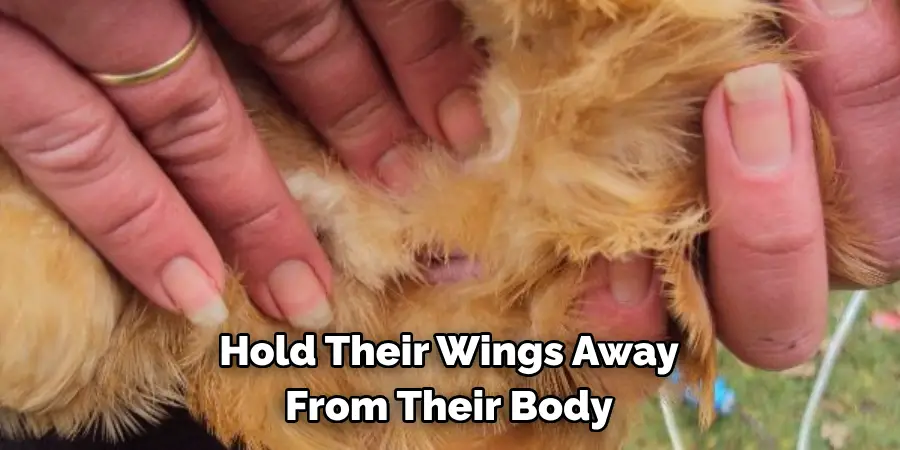
3. Lethargy
Overheating can cause your chicks to become lethargic and lose interest in their usual activities such as pecking for food or exploring their surroundings. If you observe your chicks sitting still for extended periods or not engaging in their usual behaviors, it is a sign that they are suffering from heat stress.
4. Loss of appetite
Just like humans, chickens tend to lose their appetite when feeling unwell. Overheating can cause your chicks to become disinterested in food and water, which can lead to dehydration and other health complications.
5. Weakness and stumbling
Heat stress can cause your chicks to become weak and uncoordinated, leading to stumbling or even collapsing. This is a severe sign of overheating, and immediate action should be taken to cool down their body temperature.
6. Droopy comb and wattles
A chick’s comb and wattles are highly sensitive to heat and can quickly become droopy or even turn purple when suffering from overheating. These body parts play a crucial role in regulating a chicken’s body temperature, so any changes should be closely monitored.
7. Diarrhea
Chickens who are overheated may also experience diarrhea due to increased water intake and difficulty digesting food properly. This can lead to dehydration and electrolyte imbalances, which can be life-threatening if left untreated.
8. Seeking shade and water
Lastly, it is common for chickens to seek out cool shade and water when they are feeling too hot. If you notice your chicks huddling together in the shade or continuously drinking from their water source, it is a sign that they need relief from the heat.
Recognizing these 8 signs of overheating in chicks is crucial for their health and well-being. If left untreated, heat stress can quickly escalate into heatstroke, which can be fatal for chickens. It is also important to note that young chicks are more susceptible to overheating compared to older birds.
Signs of Keeping Chickens From Pecking Each Other
1. Consider the Size of Your Chicken Coop
The first sign that your chickens may be pecking each other is if they are overcrowded in their living space. Chickens need enough room to roam freely and establish a pecking order without feeling cramped. The general rule of thumb is to allow at least 4 square feet per bird in the coop and 10 square feet in the run.
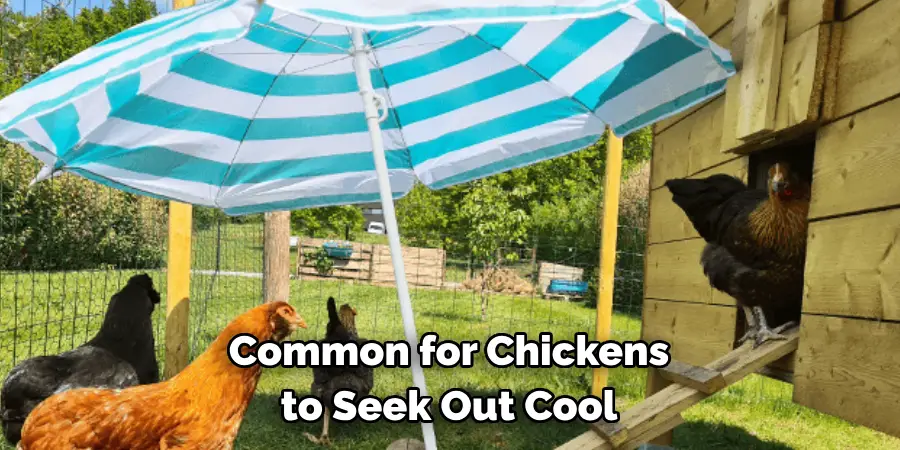
2. Provide Enough Food and Water
Chickens are social creatures, but they can also become aggressive if they feel like there is not enough food or water to go around. Make sure to provide multiple feeding and watering stations throughout the coop so that each chicken has access to their fair share. Additionally, be mindful of any dominant birds who may be hogging the resources, and consider using multiple feeding stations to prevent this.
3. Add Distractions
Chickens can become bored easily, leading them to engage in pecking behaviors out of boredom. Adding objects like perches, hanging treats, and even mirrors can provide mental stimulation for your chickens and help reduce aggressive behavior. Just make sure any objects you add are safe for chickens to interact with.
4. Introduce New Birds Gradually
If you plan on adding new chickens to your flock, be sure to introduce them gradually and carefully. New birds should be kept in a separate area from the established flock for at least a few days before being introduced. This allows them to get used to each other’s presence without physical contact, reducing the chances of fights breaking out.
5. Address Any Underlying Health Issues
Sometimes, pecking behavior in chickens can be a result of underlying health issues. Check your birds regularly for signs of illness or injury and consult with a veterinarian if necessary. If one bird is significantly weaker or injured, they may become a target for aggressive behavior from other chickens.
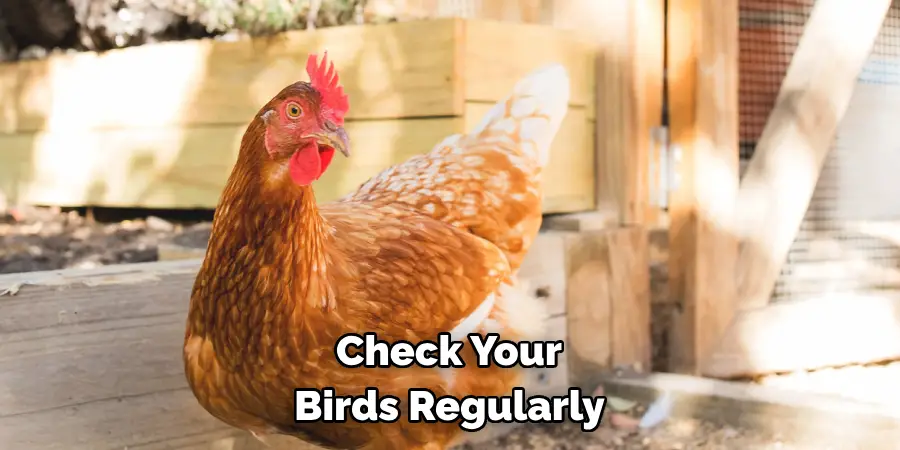
6. Provide Enough Space for Roosting
Chickens naturally like to roost at night, so it’s important to provide enough space for them to do so comfortably. If there is not enough room for all the birds to roost, this can lead to pecking and fighting over the best spots. Make sure there are multiple perches available and that they are spaced out enough for each bird to have their own space.
Keeping chickens from pecking each other is important not only for the well-being of your birds but also for the overall harmony of your flock. By following these signs and providing a comfortable and stress-free environment, you can promote peaceful interactions among your chickens.
Encouraging Natural Behaviors in the Brooder
As a poultry farmer, one of your top priorities should be to promote natural behaviors in your chicks. This not only ensures their well-being and happiness, but also results in healthier and more productive birds. Here are some tips for encouraging natural behaviors in the brooder:
- Provide Ample Space: Chicks need enough space to move around freely and exercise their natural instincts. Overcrowding in the brooder can lead to stress and aggressive behavior, hindering their development.
- Allow for Natural Lighting: Natural lighting is crucial for chicks’ growth and development. It helps regulate their body clock, promoting healthy sleeping patterns and activity levels.
- Offer Varied Perches: In nature, chickens love to perch on different objects such as branches and rocks. Providing varied perches in the brooder encourages them to exercise and develop their leg muscles.
- Incorporate Pecking Material: Chicks have a natural instinct to peck and explore their surroundings. By providing materials such as straw or grass, you can encourage this behavior and prevent pecking at each other.
- Introduce Foraging Opportunities: In nature, chickens spend a lot of time foraging for food. Mimic this behavior by scatter feeding or using foraging toys in the brooder. This not only keeps them entertained but also promotes their natural instincts.
- Encourage dust bathing: Dust bathing is an essential part of a chicken’s natural grooming routine. By providing a shallow container with sand or dirt, you can encourage this behavior in the brooder and prevent feather picking.
- Socialize With Other Chicks: Chickens are social creatures and thrive in a flock. Introducing new chicks to the brooder or keeping them with their siblings helps promote natural flock behaviors and reduces stress.
Remember, promoting natural behaviors in the brooder not only benefits your chicks but also improves their overall health and well-being. By creating a natural and enriching environment, you are setting your chicks up for a happy and productive life on the farm.

Ensuring Safety Measures in the Brooder
As a poultry farmer, it is your responsibility to ensure the safety and well-being of your birds. This starts from the very beginning, which is in the brooder stage. The brooder is where newly hatched chicks are kept until they are old enough to move into a coop or free-range area. Here are some important measures you should take to ensure the safety of your chicks in the brooder:
1. Temperature Control
Newly hatched chicks are extremely vulnerable to changes in temperature. The brooder should be kept at a constant temperature of 95-100°F for the first week, and then gradually decreased by 5 degrees each week until reaching room temperature. Use a thermometer to regularly check the temperature and adjust accordingly.
2. Adequate Space
Chicks need enough space to move around and avoid overcrowding. A good rule of thumb is to provide at least half a square foot of space per chick. However, this may vary depending on the breed and size of your chicks.
3. Clean Bedding
Cleanliness is crucial in the brooder as it helps prevent the spread of diseases. Use clean and dry bedding such as pine shavings or straw, and replace it regularly to keep the brooder clean and hygienic.
4. Ventilation
Proper ventilation is important to maintain good air quality in the brooder. This can be achieved by providing small openings or mesh windows for fresh air to enter, while also ensuring that the chicks are protected from drafts.
5. Predators
Even at a young age, chicks can fall prey to predators such as rats, mice, and snakes. Make sure the brooder is secure and predator-proof by using wire mesh or hardware cloth to cover any openings.
6. Water and Food Supply
Chicks require clean water and proper nutrition for growth and development. Provide them with a constant supply of fresh water and starter feed specifically designed for chicks.
With these measures in place, you can ensure the safety and well-being of your chicks during their crucial brooder stage. However, it is important to regularly monitor the brooder and make any necessary adjustments to maintain a safe and healthy environment for your growing flock.

Conclusion
In conclusion, keeping chickens from pecking each other can be a challenging task. However, with the right approach and preventative measures, it is possible to create a peaceful and harmonious chicken flock. One of the keys to preventing pecking behavior is ensuring that your chickens have enough space in their living area.
Overcrowding can lead to stress and aggression among birds, so make sure to provide at least 4 square feet of space per chicken in the coop and 10 square feet per bird in the outdoor run. Another important factor is keeping your chickens well-fed and hydrated. Hungry or thirsty birds are more likely to display aggressive behavior, so make sure they always have access to clean water and a balanced diet. I hope this article has been beneficial for learning how to keep chickens from pecking each other. Make Sure the precautionary measures are followed chronologically.
About
Outdoor Fixes is a distinguished figure in the world of Diy design, with a decade of expertise creating innovative and sustainable Diy solutions.
His professional focus lies in merging traditional craftsmanship with modern manufacturing techniques,
fostering designs that are both practical and environmentally conscious. As the author of diy,
outdoorfixes delves into the art and science of outdoorfixes-making, inspiring artisans and industry professionals alike.
Education RMIT University
(Melbourne, Australia) Associate Degree in Design (Outdoor Fixes) Focus on sustainable design, industry-driven projects,
and practical craftsmanship. Gained hands-on experience with traditional and digital manufacturing tools, such as CAD and CNC software.
Nottingham Trent University
(United Kingdom) Bachelor’s in outdoorfixes.com and Product Design (Honors) Specialized in product design with a focus on blending creativity with production
techniques. Participated in industry projects, working with companies like John Lewis and Vitsoe to gain real-world insights.
Publications and Impact
In diy, Outdoor Fixes his insights on indoor design processes, materials, and strategies for efficient production.
His writing bridges the gap between artisan knowledge and modern industry needs, making it a must-read for both budding designers and seasoned professionals.

